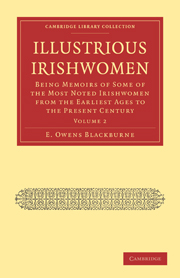 Illustrious Irishwomen
Illustrious Irishwomen Published online by Cambridge University Press: 07 September 2011
died, a.d. 1793.
THE subjects of the preceding three memoirs—Susanna Centlivre, Hon. Mrs. Monk, and Constantia Grierson—were all women well skilled in the classical languages, and also in the more modern tongues of Europe. With the sole exception of French, we do not know if Charlotte Brooke was well acquainted with any modern language; but any deficiency in this respect was fully compensated for by the vast and accurate knowledge which she possessed of the language and literature of the ancient Irish.
Charlotte Brooke was the daughter of Henry Brooke, Esq., of Rantavan, Co. Cavan, Ireland, who married his cousin, Miss Meares—a lady for ever famous as being the only woman of whom Dean Swift was afraid. Henry Brooke was a man of much culture and learning, and a graceful and brilliant writer. His Farmer's Letters—after the style of the Drapier's Letters—are models of style; he was also the author of several plays, notably “Gustavus Vasa,” and several novels and romances. He had a numerous family, but of all his children, only two survived—a son, Arthur, who died early in the service of the East India Company, and Charlotte, the subject of this memoir.
She was literally the child of his old age, clever and intelligent beyond her years, and well fitted to be the companion of her accomplished father. He soon perceived her abilities, and spared no pains in striving to direct her literary taste.
To save this book to your Kindle, first ensure no-reply@cambridge.org is added to your Approved Personal Document E-mail List under your Personal Document Settings on the Manage Your Content and Devices page of your Amazon account. Then enter the ‘name’ part of your Kindle email address below. Find out more about saving to your Kindle.
Note you can select to save to either the @free.kindle.com or @kindle.com variations. ‘@free.kindle.com’ emails are free but can only be saved to your device when it is connected to wi-fi. ‘@kindle.com’ emails can be delivered even when you are not connected to wi-fi, but note that service fees apply.
Find out more about the Kindle Personal Document Service.
To save content items to your account, please confirm that you agree to abide by our usage policies. If this is the first time you use this feature, you will be asked to authorise Cambridge Core to connect with your account. Find out more about saving content to Dropbox.
To save content items to your account, please confirm that you agree to abide by our usage policies. If this is the first time you use this feature, you will be asked to authorise Cambridge Core to connect with your account. Find out more about saving content to Google Drive.